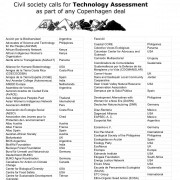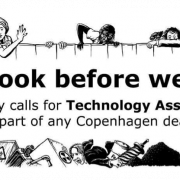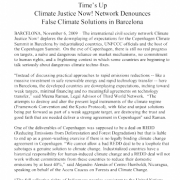Press Release: LOOK BEFORE LEAPING!
Submitted by ETC Staff on
Over 160 civil society groups, including social movements and non-governmental organizations (NGOs), released a joint declaration on technology: “Let's Look Before We Leap!”. The declaration alerts governments to the absence of any precautionary environmental and social assessment mechanisms in the draft Copenhagen agreement on technology, and claims that the current approach poses grave threats to human health, human rights, rural livelihoods, diverse ecosystems and climate stability.






